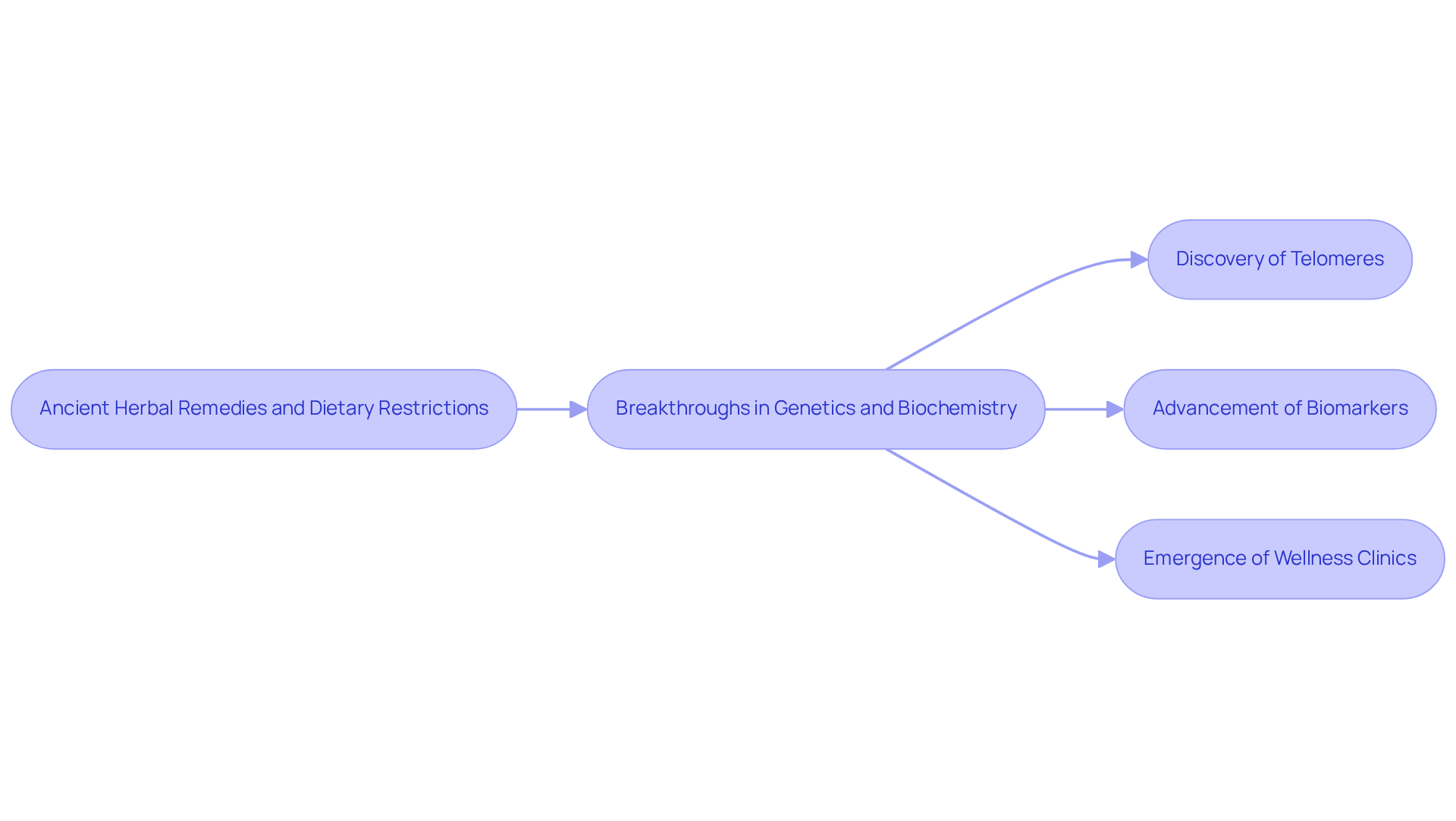Understanding Longevity Medicine: Key Concepts and Benefits
Overview
Longevity medicine represents a specialized healthcare discipline focused on extending both lifespan and healthspan. This is achieved through personalized preventive measures and interventions that target the biological mechanisms of aging. The significance of comprehensive wellness strategies, which include diagnostics and nutrition, cannot be overstated. These strategies play a crucial role in enhancing individual well-being and addressing the widening healthspan-lifespan gap. As a result, longevity medicine is increasingly recognized as an essential component of modern healthcare.
Have you considered how longevity medicine could impact your life? By understanding and implementing these personalized approaches, individuals can take proactive steps toward a healthier future. This field not only highlights the importance of tailored healthcare but also encourages a shift in how we view aging and health. Exploring these concepts further can lead to valuable insights and actionable strategies for enhancing your well-being.
Introduction
Longevity medicine is at the forefront of a healthcare revolution, aiming not only to extend lifespan but also to improve the quality of life as individuals age. By harnessing advanced diagnostics and personalized interventions, this emerging discipline provides a roadmap to healthier aging.
Tailored wellness strategies address the unique needs of each individual, making it a transformative approach. As the gap between healthspan and lifespan continues to widen, a pressing question arises: how can longevity medicine bridge this divide and transform societal approaches to aging?
Define Longevity Medicine: Core Concepts and Importance
A specialized healthcare discipline known as longevity medicine is dedicated to extending both lifespan and healthspan through preventive measures and personalized interventions. This area focuses on comprehending the biological mechanisms of senescence and utilizing sophisticated diagnostics, such as biomarkers, to customize wellness strategies for individuals. The main objective of longevity medicine is not only to extend life but also to improve the quality of life as one ages, making it increasingly essential in today’s society of older individuals. By integrating various disciplines—including nutrition, genetics, and lifestyle modifications—comprehensive health plans are created by longevity medicine to cater to the unique needs of aging individuals.
Recent advancements in this field have highlighted the significance of personalized interventions. For instance, wellness clinics now provide comprehensive testing sessions that include:
- Blood tests
- Body composition analysis
- Cognitive assessments
- Lifestyle evaluations
These enable customized recommendations for improving lifespan. Statistics indicate that the healthspan-lifespan gap in the U.S. has increased from 10.9 years in 2000 to 12.4 years in 2024, highlighting the urgent need for effective strategies for extended living to tackle this growing disparity.
Specialists in this area support the acknowledgment of age-related medicine as an official medical field, emphasizing its ability to enhance wellbeing results. As noted by Evelyne Bischof, director of the Sheba Longevity Center, ‘It is essential for longevity medicine to become mainstream, allowing more people to access a full range of diagnostic tests that could detect early signs of age-related diseases.’ This perspective aligns with the growing recognition of the importance of preventive healthcare in enhancing quality of life and reducing long-term medical costs.
Furthermore, the importance of quality nutrition, encompassing the intake of animal-based foods and dietary supplements, is progressively acknowledged as a crucial element of strategies for a long life. Personal experiences shared by anti-aging enthusiasts, including insights from the Hunza people recognized for their exceptional lifespan, highlight the advantages of a nutrient-rich diet in enhancing well-being and vitality as one ages. ByKomi.com serves as a thorough resource for individuals looking to discover innovative therapies and nutritional recipes that promote healthy longevity.
In summary, longevity medicine represents a crucial intersection of science and health, offering innovative solutions for individuals seeking to age gracefully and healthily. By prioritizing preventive measures and personalized interventions, individuals can significantly enhance their overall well-being as they navigate the process of aging.
Trace the Evolution of Longevity Medicine: Historical Context and Milestones
The origins of life-extending medicine can be traced back to ancient practices that aimed to prolong life through herbal remedies and dietary restrictions. However, the modern evolution of this field began to take shape in the late 20th century, propelled by breakthroughs in genetics and biochemistry. Major milestones encompass the discovery of telomeres, which serve an essential function in cellular deterioration, and the advancement of biomarkers that assist in evaluating biological age. Furthermore, the creation of wellness clinics offering personalized health evaluations has further advanced the field, providing tailored strategies for individuals seeking to enhance their healthspan.
In recent years, the momentum behind longevity medicine has surged, driven by an increasing awareness of elderly populations and the urgent need for effective preventive healthcare strategies. This discipline is now acknowledged as a valid medical domain, with ongoing research in longevity medicine centered on revealing the biological processes of senescence. For instance, Dr. Dituri’s comprehensive research involved rigorous medical assessments, including blood tests, cognitive evaluations, and advanced imaging techniques, to analyze changes in telomere length and other health metrics. These evaluations are essential for comprehending how treatments such as hyperbaric oxygen therapy (HBOT) may affect the process of getting older.
Specialists highlight that the development of longevity medicine aims not only to prolong lifespan but also to enhance the quality of life as people grow older. As highlighted by prominent scholars, the incorporation of scientific progress with practical wellness strategies is crucial for tackling the challenges presented by growing older. This comprehensive method seeks to enable people to take charge of their well-being, ensuring that the process of aging is not just extended but also more beneficial.

Examine Key Principles of Longevity Medicine: Methods and Benefits
Essential concepts of longevity medicine encompass individualized wellness evaluations, preventive measures, and a comprehensive approach to well-being. These methods typically involve thorough assessments of a person’s health, including genetic testing, lifestyle evaluations, and biomarker analysis. The benefits of such approaches are significant: they enhance disease prevention, improve both mental and physical well-being, and promote longevity medicine.
For example, individuals can develop personalized dietary plans that are rich in nutrients and beneficial for cellular health, engage in regular physical activity, and explore treatments like hormone optimization to sustain vitality. Collectively, these strategies promote longevity medicine by supporting a healthier aging process, allowing individuals to enjoy a higher quality of life as they age. Furthermore, preventive measures have been shown to substantially reduce the risk of chronic illnesses, underscoring the importance of proactive health management in the context of longevity medicine.
Explore Components of Longevity Medicine: Nutrition, Therapies, and Practices
The elements of longevity medicine encompass a diverse range of practices, prominently featuring nutrition, physical activity, and innovative therapies. Nutrition serves as a foundation, with a strong emphasis on diets rich in animal-based foods, recognized for their ability to deliver essential nutrients that support longevity. Research indicates that higher intakes of quality animal foods correlate with lower all-cause mortality, particularly among younger individuals. Furthermore, innovative therapies such as hormone replacement therapy, oxytocin supplementation, and advanced medical devices like the Emsella chair are being explored for their potential to enhance vitality and overall well-being. LDN, specifically, has shown promise in promoting brain health by decreasing microglial activation, which is crucial in addressing neurodegenerative diseases and mood disorders. Its efficacy in alleviating chronic pain conditions, such as fibromyalgia, further underscores its role in enhancing mental well-being through effective pain management.
Lifestyle practices also play a crucial role in the field of longevity medicine. Engaging in consistent physical activity and managing stress through mindfulness techniques, along with nurturing social connections, significantly enhance mental and emotional well-being. Research has shown that individuals who maintain active social lives and effectively handle stress display improved wellness as they age. By integrating these elements, age-related medicine aims to establish a comprehensive approach to well-being, empowering individuals to navigate their maturation process and enhance their quality of life.
Case studies further illustrate the impact of these practices. For instance, individuals adhering to the Longevity Diet, which emphasizes a balance of high-quality animal and plant-based foods, have demonstrated improved health metrics and increased lifespan. Moreover, the effectiveness of hormone replacement therapies and LDN is supported by findings suggesting they can mitigate age-related decline in physical and cognitive functions. Overall, the synergy between nutrition, innovative therapies, and lifestyle practices forms the cornerstone of longevity medicine, offering a comprehensive framework for promoting healthy aging.
Conclusion
Longevity medicine represents a significant advancement in healthcare, concentrating on enhancing both lifespan and healthspan through tailored interventions and preventive strategies. This discipline underscores the necessity of understanding biological aging mechanisms and employing personalized diagnostics to formulate effective health plans that address individual needs. As society encounters an increasing number of aging individuals, the importance of longevity medicine becomes increasingly evident, providing solutions that strive not only to extend life but also to enrich its quality.
In exploring longevity medicine, several key concepts have surfaced, such as:
- The importance of personalized wellness evaluations
- The impact of nutrition
- The integration of innovative therapies
From historical practices dating back to ancient times to contemporary advancements in genetics and biochemistry, the evolution of this field showcases its transformative potential. The inclusion of comprehensive assessments—like blood tests and lifestyle evaluations—illustrates how individualized approaches can markedly enhance health outcomes and mitigate the risk of chronic diseases.
Reflecting on the insights shared, it is clear that longevity medicine transcends merely adding years to life; it is about enhancing the vitality and well-being of individuals as they age. The call to action is for heightened awareness and accessibility of these practices, urging individuals to adopt preventive healthcare and personalized wellness strategies. By prioritizing nutrition, engaging in physical activity, and exploring innovative therapies, individuals can take proactive steps toward a healthier, more fulfilling life as they navigate the aging process.
Frequently Asked Questions
What is longevity medicine?
Longevity medicine is a specialized healthcare discipline focused on extending both lifespan and healthspan through preventive measures and personalized interventions, aiming to improve the quality of life as individuals age.
What are the core concepts of longevity medicine?
The core concepts include understanding the biological mechanisms of aging (senescence), utilizing sophisticated diagnostics like biomarkers, and creating comprehensive health plans that integrate nutrition, genetics, and lifestyle modifications tailored to the unique needs of aging individuals.
What types of testing are involved in longevity medicine?
Testing in longevity medicine often includes blood tests, body composition analysis, cognitive assessments, and lifestyle evaluations to provide customized recommendations for improving lifespan.
What does the healthspan-lifespan gap refer to?
The healthspan-lifespan gap refers to the difference between the number of years a person lives in good health (healthspan) and their total lifespan. In the U.S., this gap has increased from 10.9 years in 2000 to 12.4 years in 2024, indicating a growing need for effective strategies to extend healthy living.
Why is there a call for longevity medicine to become mainstream?
There is a call for longevity medicine to become mainstream to allow more people access to a comprehensive range of diagnostic tests that can detect early signs of age-related diseases, ultimately enhancing well-being and reducing long-term medical costs.
What role does nutrition play in longevity medicine?
Nutrition is recognized as a crucial element in longevity medicine strategies, emphasizing the intake of nutrient-rich foods, including animal-based foods and dietary supplements, which contribute to enhanced well-being and vitality as individuals age.
How does ByKomi.com contribute to longevity medicine?
ByKomi.com serves as a resource for individuals seeking innovative therapies and nutritional recipes that promote healthy longevity, helping people discover ways to enhance their overall well-being as they age.
What is the overall goal of longevity medicine?
The overall goal of longevity medicine is to provide innovative solutions for individuals seeking to age gracefully and healthily by prioritizing preventive measures and personalized interventions to significantly enhance their well-being throughout the aging process.






